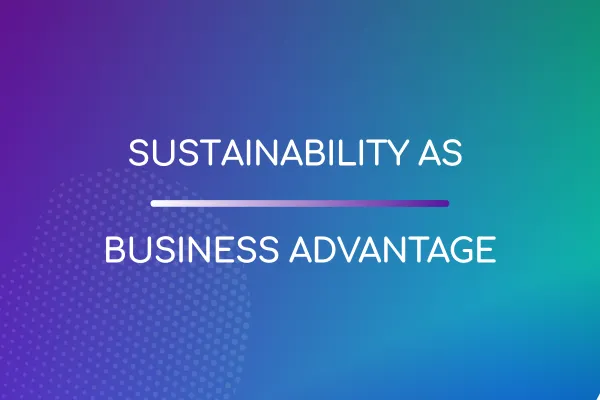Read Our Latest Blogs
Welcome to our blog where we embark on a journey to explore the transformative potential of sustainability for small and medium-sized businesses (SMBs). In the wake of climate change, resource depletion, and a heightened awareness of our environmental impact, SMBs stand at the forefront of redefining success by placing equal importance on profitability and planet-friendly practices.

How SMBs Are Using Sustainability To Get Ahead In A Challenging Economy
In the face of a challenging economic landscape, small and medium-sized businesses (SMBs) are increasingly turning to sustainability as a strategic tool to gain a competitive edge. The adoption of carbon accounting in particular, has emerged as a pivotal element in their sustainability initiatives, allowing these businesses to not only reduce their environmental impact but also enhance their financial performance and market position.
The Growing Importance of Sustainability for SMBs
In recent years, consumer preferences have shifted towards environmentally conscious products and services. According to leading online newspaper The Fifth Estate, Nine in 10 Australian consumers are more likely to purchase ethical and sustainable products, with the survey also revealing that 85 per cent of consumers want retailers and brands to be more transparent about the sustainability of their products.
This shift has prompted SMBs like Hither & Yon to capitalise on the opportunities presented by eco-conscious initiatives. The integration of sustainable practices helps them attract environmentally-conscious consumers, build brand loyalty, and differentiate themselves in a crowded market.
Carbon Accounting as a Strategic Sustainability Tool
Carbon accounting involves measuring and analysing the amount of greenhouse gas emissions produced by an organisation. SMBs are increasingly recognising the benefits of obtaining a comprehensive view of their environmental impact.
This data empowers businesses to make informed decisions about reducing their carbon footprint and optimising business operations.
As global attitudes toward sustainability evolve, businesses that proactively address their environmental impact are better positioned for long-term viability. This sentiment is echoed by The Australian Manufacturing Forum article, "The road to green growth within Manufacturing". The author emphasizes how the Australian manufacturing industry must prioritise evolution to adopt sustainable practices centred around their day-to-day activities or risk being left in the dust.
Carbon accounting helps SMEs future-proof their operations and adapt to changing market expectations.
Enhanced Cost Savings and Operational Efficiency
Implementing carbon accounting goes beyond environmental stewardship; it can also lead to significant cost savings.
For instance, Hither & Yon's carbon footprint allowed them to identify improvement areas for energy efficiency, waste reduction, and optimising their operational processes. By streamlining their operations, businesses can cut costs, enhance resource efficiency, and ultimately boost their bottom line.
Access to New Markets and Funding Opportunities
Sustainability initiatives, including robust carbon accounting practices, open doors to new markets and funding opportunities. In 2023, both Amazon and Microsoft announced that suppliers will be required to report carbon emissions data and to have established emissions reduction goals. These companies will select suppliers based on levels of emissions and reduction progress.
Many organisations and consumers are now actively seeking out businesses that prioritise environmental responsibility, and investors are increasingly interested in supporting eco-friendly enterprises. SMBs with strong sustainability profiles may find it easier to access capital and build partnerships, providing a crucial advantage in a struggling economy.
Regulatory Compliance and Risk Mitigation
As governments worldwide implement stricter environmental regulations, SMBs that proactively engage in sustainability practices, including carbon accounting, position themselves for compliance and risk mitigation.
In line with the announcements from Amazon and Microsoft, Queensland Government procurement strategy will now preference Climate Active certified (or credible equivalent) suppliers, and this criterion will increase to a mandatory standard by 2030. Other states are likely to follow as sustainability becomes business as usual.
Anticipating and addressing regulatory requirements not only helps to foster business resilience and competitiveness but also demonstrates a commitment to long-term viability and responsible corporate citizenship.
How Evalue8 helps you take control of your sustainability journey
Evalue8 Sustainability Pty Ltd (Evalue8) is a specialist software company based in Canberra that provides a sustainability platform for organisations to measure their environmental impact and progress towards becoming clean and green.
Our software helps small and medium businesses track their emissions over time and generate clear reporting so stakeholders can easily understand your organisation’s sustainability performance, fostering trust and credibility.
We help businesses develop an emissions reduction plan by providing data driven insights that identify opportunities for potential savings, operational efficiency and continuous improvement.
If you’re looking for software to help you measure, report and reduce your emissions with the guidance of carbon consultants, schedule a demo with us today.
Conclusion
Integrating environmental responsibility is a strategic investment that aligns small and medium sized businesses with sustainability trends and helps them to thrive in an evolving economy.

